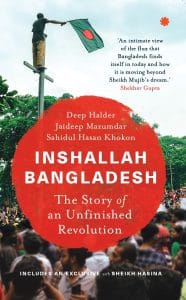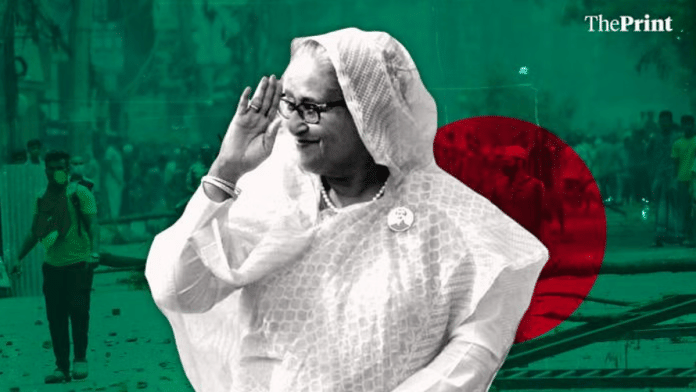Why “Inshallah Bangladesh”?’
We had not expected Sheikh Hasina to ponder over the title of the book we were writing.
It was on the day of Eid Al-Adha, popular as Bakrid, on Saturday, 7 June 2025, that our request to speak to her had been granted. The time was 6.13 p.m. IST. We dialled a private number at the exact time we had been asked to call, and after a few seconds, Hasina took the call herself.
It was hard to believe that on the other end of the line was Sheikh Hasina Wazed, Bangladesh’s prime minister till 5 August 2024, who still signed off as Bangladesh’s premier since she said she never resigned. The Mohammad Yunus administration was an unconstitutional, illegal one according to her.
A few hundred questions swarmed our minds, but ‘no interview’, we had been strictly told.
We exchanged Eid greetings with the woman who had ruled Bangladesh with an iron fist for fifteen straight years. She sounded like she was in good mood.
We told her we were writing a book on Bangladesh after the July Revolution. ‘Don’t call it a revolution!’ Hasina’s mood was suddenly stern. ‘It was a terror attack on Bangladesh disguised as a students’ revolt planned by America and executed by Pakistan. It was done to remove me from power. Whether it was Abu Sayed or other student leaders, the killings were not done by the police. They were killed by terrorists and the killings were passed off as police brutality to turn the public against my government,’ she told us without pause.
This was the point where we could have posed a counter question to her or asked her to tell us more about the revolution that she believed was not one. Did she not see the large number of students on streets being attacked by her police?
But we had been warned that Hasina would not take any questions and this was to be only a courtesy call, not to be published in any news outlet.
Hasina had refused to speak to the press, local or global, ever since she had taken refuge in India. There had been speculative news about her whereabouts but no confirmation.
Thus far, Hasina had only spoken to her party cadre over group phone calls and to Bangladeshi citizens through online addresses. After months of pursuing Awami League top leadership as well as her personal aides, we had been granted a few minutes to greet her on Eid.
We did not interrupt her.
We told her we were writing a chapter on the July uprising and would try to explore all angles. She asked us again: ‘Why is your book titled Inshallah Bangladesh? ‘Bangladesh’s fundamentalist Muslims do not read. They only hear what others say and come out on the streets to unleash violence. You may have used the word “Inshallah” figuratively, but they would interpret this as you criticizing Bangladesh using the name of Allah. These people do not read religious texts, they only hear things and react,’ she told us.
We assured her the book would not take a reductionist view of Bangladesh or only look at the country after the events of July–August 2024 but attempt to go back in time and trace the origins of fundamentalism and social fissures. We would also put out the mistakes of her father Sheikh Mujibur Rahman and her government.
Hasina did not respond for a few seconds. Should we not have disclosed this bit about her father? Would the ‘conversation’ end abruptly now?
Then Sheikh Hasina spoke: ‘Of course. You are free to criticize me, my party and my government. But do not criticize my country.’
Also read: When Giorgia Meloni announced her pregnancy, and was met with insults, sarcasm, controversy
That was not why we were writing the book, we assured Hasina. What we were trying to write about were the reasons behind the rise and spread of fundamentalism in Bangladesh before and after the upheavals of July–August 2024 and examination of the roles of major political forces, including hers, to abet or arrest such forces, we told her again.
‘Write about these forces. Write how Pakistan’s fundamentalist forces have not only supported such forces within Bangladesh even after 1971 but expanded their own terror networks inside my country. Make sure your book reaches not only Indian and Bangladeshi readers but readers across the world. Let the world see the true faces of the Bangladesh Jamaat-e-Islami and the BNP. Tell the world how these forces destroyed public property in the name of students’ revolution, how they killed policemen, the meticulous design that went behind the killing of protesting students. Also let the world know how supporters, workers and leaders of the Awami League were targeted after 5 August, brutally killed, their houses set on fire, their business establishments snatched.’ Hasina’s voice was unwavering in cold anger.
We told her we were trying to research all of these facts and put them in the book.
‘You know who is the main man behind all of this? It is Yunus. The Americans wanted St Martin’s Island from me. If I had agreed they would not have removed me from power. But I did not agree to sell my country to remain premier. It was the Americans who used Yunus to plot against me and remove me. Yunus was behind the plotting, financing and execution of the terror attack on Bangladesh during July–August last year at the behest of the Americans. He is a cheat who has destroyed his country for his ambitions. Now he and his coterie are looting the country and running it to the ground. Write about this too so that the world knows,’ she said.
We had been reporting on Bangladesh for our respective news outlets and would write on the current regime in our book, we told Hasina.
‘Everybody is out to ruin my “Sonar Bangla”. The student coordinators are involved in corruption, so also are the members of the new student’s party, and the advisors of the Yunus administration. The media is not being allowed to report all this. I had tried to build a modern nation. They have destroyed everything,’ she lamented over the phone.
We could have interjected at this juncture, asked her about the serious charges against her own administration. But we kept our promise to her top aides that this would not be an interview but a courtesy call. And getting to hear Sheikh Hasina’s take on recent events in Bangladesh, even if it sounded like a rant against an adversary who had bested her, was priceless.
‘My citizens are suffering. The media is not being allowed to report the truth. No one is in peace. Prices are skyrocketing, patients are not getting proper treatment at hospitals, public transport networks are shutting down because of unchecked corruption. It is now up to us to bring Bangladesh back from the brink. I have to save the country.’
Does she plan to return to Bangladesh? We managed to slip in a question. ‘Inshallah, I shall return. I will deliver justice to my people and bring to book these people who have betrayed my nation. Listen, people now know they have been betrayed, they want to be set free from the clutches of these imposters. Soon they will be able to tackle these terror apologists and become free again. It is only a matter of time. I wish you luck with the book. Inshallah.’
We wished her good health in return as the line went cold.
We checked the time on our watch. It was 6.26 p.m. IST. We had spoken to Sheikh Hasina for thirteen minutes, mostly listening to her monologue which could be well be her next election speech if her party was allowed to participate in the polls. What would the Yunus administration say if they were to know of this conversation? Every time Sheikh Hasina had addressed her citizens there had been sharp reactions from the current government and from the vigilantes.
After a mob brought down the residence of her father, Sheikh Mujibur Rahman, in Dhaka on 6 February, 2025, the media reported that the violence was triggered by a speech that Hasina intended to deliver to her supporters from exile in India.
How would the mob react if they knew Hasina had spoken her mind to one Bangladeshi and two Indian journalists? How would the peace-loving Bangladeshi react?
A thirteen-minute conversation with an out-of-power Hasina seemed woefully inadequate, even if it was a scoop of sorts.

This excerpt from ‘Inshallah Bangladesh: The Story of an Unfinished Revolution’ by Deep Halder, Jaideep Mazumdar, and Shahidul Hasan Khokon has been published with permission from Juggernaut.






